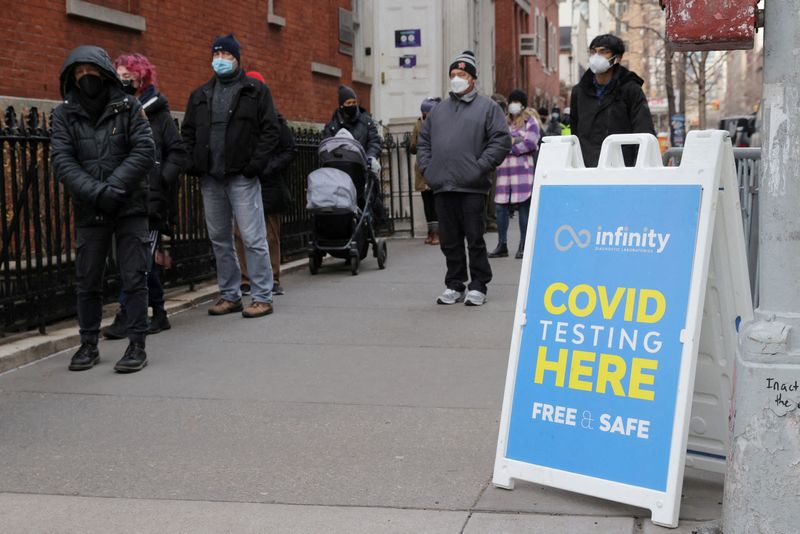By Jonnelle Marte
(Reuters) - The fast-spreading Omicron variant of COVID-19 has started leaving an imprint on slices of the U.S. economy as some events are canceled or postponed, consumers cut back on restaurant dining and understaffed businesses shut down in some of the most-afflicted areas such as New York City.
But even as economists say the variant could be a drag on growth early next year, they caution it is too soon to gauge the mark that will be left by an iteration of the virus that may on balance prove less severe even if it is the most transmissible version yet in nearly two years of the pandemic. It also seems unlikely at this stage to prevent a second straight year of above-trend growth.
Preliminary data out Thursday from the U.K. government showed a 50-70% lower probability of an Omicron infection resulting in hospitalization than with the Delta variant. That followed a study on Wednesday from South Africa, where Omicron was first identified last month, that suggested infections peaked quickly there and symptoms were less severe.
Nonetheless, Mark Zandi, chief economist for Moody's (NYSE:MCO) Analytics, expects the U.S. economy to take a hit in the near term from a surge that could infect more people than earlier waves but end more quickly. He now forecasts the U.S. economy will grow by 2% in the first quarter of 2022, down from 5%.
"Omicron is already affecting people’s behavior and business practices," said Zandi, pointing to a decline in credit card spending over the past several weeks.
Credit card balances were fractionally lower in the week ending Dec. 8, marking the first time since October that they didn't increase week over week, according to the Federal Reserve.
Consumers are also cutting back on trips to restaurants as the virus spreads. The number of diners seated at U.S. restaurants was down 10% for the week ending Dec. 23 when compared with the same week in 2019, according to the restaurant reservations site OpenTable. That is lower than Nov. 25, when dining activity was on par with 2019 levels.
"The situation is changing rapidly and this is far from the resurgence many restaurants were counting on this holiday," Debby Soo, chief executive of OpenTable, said in a statement to Reuters.
Still, other parts of the economy appeared to be running as usual for now.
The number of Americans filing new claims for unemployment benefits held below pre-pandemic levels last week. And while workplace activity declined slightly last week after rising earlier in December, it was in line with the drop seen heading into the holidays in 2019 and stronger when compared to the same time last year, said Dave Gilbertson, vice president of the payroll management firm UKG.
"So far, we haven’t seen widespread business shutdowns, and customer demand remains strong across industries," Gilbertson said in an email.
And Americans by and large seemed more committed to their holiday travel plans. The number of people checked through airport security in the approach to Christmas is roughly double last year's volumes, Transportation Security Administration data showed. Wednesday's total exceeded the comparable 2019 level by about 144,000 passengers, one of only a handful of days so far to top pre-pandemic levels and by the largest margin yet.
TOO EARLY TO KNOW
Some analysts say it may just be too soon for the effects of Omicron to show up in economic reports.
Consumer sentiment improved in December but Richard Curtin, director of the University of Michigan's Surveys of Consumers said "too few interviews" were done to capture the impact of the Omicron variant.
"Confidence and spending are likely to be depressed in January, but it is too early to know the eventual impact of Omicron on the economy," Curtin said in a statement on Thursday.
Some economists are downgrading their forecasts for how much the U.S. economy and the labor market will grow early next year amid a surge in infections and a decline in fiscal support.
Oxford Economics lowered its growth projections for next year to 4.1% from 4.4% because of the surge in infections, and says growth could slow to 3.7% if President Joe Biden's Build Back Better spending plan is completely blocked. The package's odds of passing dimmed after Senator Joe Manchin said he would not support the bill, but some analysts say a modified version of the bill could be approved later.
And Aneta Markowska and Thomas Simons, economists for Jefferies, earlier this week said economic activity is likely to soften in January, and they "see relatively high probability" the labor market could contract next month, similar to December 2020, if more businesses furlough workers because of the virus.
Biden announced new steps this week meant to stem the health and economic consequences of the infection surge, including new sites for testing and vaccination, more at-home rapid tests and an extension of the pause on student loan payments until May 1, 2022.
Zandi says that despite the slowdown he is expecting, growth could rebound quickly in the second quarter and the economy could expand by just over 4% next year. That would be almost double the annual growth rate that prevailed in the decade before the pandemic.
